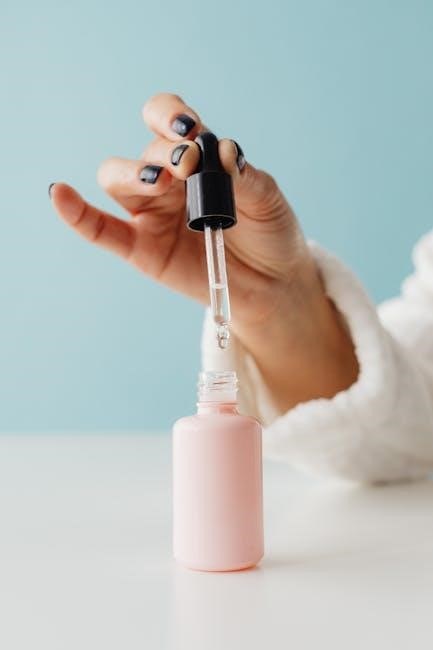Understanding Skin Health Basics
Healthy skin is the foundation of a glowing complexion, influenced by genetics, lifestyle, and environmental factors. Proper care involves balancing hydration, protection, and nourishment to maintain its natural barrier and appearance.
What is Skin Health?
Skin health refers to the skin’s ability to function effectively as a protective barrier while maintaining its appearance and resilience. Healthy skin is characterized by its strength, hydration, and ability to regenerate. It is influenced by genetics, diet, lifestyle, and environmental factors. Maintaining skin health involves understanding one’s skin type, managing conditions like acne or eczema, and protecting against environmental stressors. Proper skincare practices, nutrition, hydration, sleep, and sun protection are essential for achieving and maintaining optimal skin health, which contributes to both its functional and aesthetic well-being.
Key Components of Skin Health
Key components of skin health include hydration, barrier function, and protection from environmental stressors. Hydration keeps the skin plump and supple, while a strong barrier prevents moisture loss and shields against harmful elements. Sunscreen is crucial for protecting against UV damage, which can lead to premature aging and skin conditions. Nutrition plays a vital role, with essential vitamins and minerals like Vitamin C and omega-3 fatty acids supporting skin elasticity and clarity. Regular cleansing and moisturizing maintain skin balance and prevent issues like acne or dryness. Together, these elements form the foundation of a comprehensive skincare routine aimed at achieving and preserving healthy, radiant skin.

Building a Daily Skin Care Routine
A consistent daily skin care routine is essential for maintaining healthy, glowing skin. It involves cleansing, hydrating, and protecting the skin, tailored to individual needs and concerns.
Step 1: Cleansing and Toning
Cleansing is the first and most crucial step in any skin care routine. It removes dirt, oil, and impurities that accumulate on the skin throughout the day. Using a gentle cleanser suitable for your skin type ensures effective cleansing without stripping the skin of its natural moisture. Toning follows, balancing the skin’s pH and preparing it for subsequent products. Toners can also address specific concerns, such as hydration or minimizing pores. For sensitive skin, opt for fragrance-free products, while oily skin may benefit from toners containing salicylic acid. Consistency is key to maintaining a clean and balanced canvas for the rest of your routine.
Step 2: Moisturizing and Hydration
Moisturizing is essential for maintaining skin hydration and elasticity. It locks in previous steps’ benefits and protects the skin from environmental stressors. Choose a moisturizer based on your skin type—lightweight for oily skin, rich for dry skin. Hydration starts from within; drinking water keeps skin cells plump and radiant. External hydration can be enhanced with serums containing hyaluronic acid or ceramides. Applying moisturizer while skin is damp maximizes absorption, ensuring long-lasting hydration. Consistent hydration helps maintain the skin’s barrier function, reducing the appearance of fine lines and improving texture for a youthful glow. Balance is key to avoid overhydration, which can lead to clogged pores. Regular moisturizing supports skin health and resilience.
The Role of Sunscreen in Skin Health
Sunscreen is vital for protecting skin from harmful UV rays, preventing burns, and reducing signs of aging. Daily use, even on cloudy days, safeguards skin health and maintains youthful radiance.
How Sunscreen Works
Sunscreen protects skin by creating a physical or chemical barrier against harmful UV rays. Physical sunscreens, like zinc oxide, reflect UV light, while chemical ones, such as avobenzone, absorb and neutralize it.
Active ingredients in sunscreen prevent UV damage by either deflecting or converting UV radiation into heat, which is released harmlessly. This dual action shields the skin from burns, premature aging, and long-term damage.
Proper application is key: apply generously 30 minutes before sun exposure and reapply every two hours. SPF ratings indicate protection levels against UVB rays, with higher numbers offering greater defense, though no sunscreen provides complete protection.
Best Practices for Sunscreen Use
For effective sun protection, apply sunscreen liberally 30 minutes before exposure. Use about one ounce (a shot glass full) for full-body coverage. Reapply every two hours, or immediately after swimming or sweating.
Choose a broad-spectrum sunscreen with SPF 30 or higher for optimal protection against UVA and UVB rays. Apply evenly to all exposed areas, including often-overlooked spots like ears, neck, and feet.
Don’t rely solely on SPF; wear protective clothing, seek shade, and avoid peak sun hours (10am–4pm) for added defense. Consistency is key—use sunscreen daily, even on cloudy days, to maintain skin health and prevent long-term damage.

Nutrition and Skin Health
A balanced diet rich in vitamins, minerals, and antioxidants is crucial for skin health. Foods like berries, nuts, and fatty fish support collagen production and protect against environmental stressors.
Essential Nutrients for Skin Health
A well-balanced diet is vital for maintaining healthy skin. Key nutrients like vitamin A, vitamin C, and vitamin E play crucial roles in protecting the skin from damage and promoting collagen production. Vitamin A helps regulate skin cell turnover, reducing the appearance of fine lines and acne. Vitamin C is essential for collagen synthesis, brightening the complexion, and combating oxidative stress. Vitamin E acts as a powerful antioxidant, shielding the skin from environmental stressors like UV rays and pollution. Zinc supports immune function and wound healing, while omega-3 fatty acids reduce inflammation and improve skin elasticity. Incorporating these nutrients into your diet ensures a radiant, resilient complexion.
The Impact of Hydration on Skin
Hydration is fundamental for maintaining healthy, vibrant skin. Water makes up approximately 60% of the skin, playing a crucial role in its elasticity and plumpness. When the skin is well-hydrated, it appears radiant, with improved texture and tone. Dehydration can lead to dullness, dryness, and the accentuation of fine lines and wrinkles. Drinking enough water helps flush toxins, preventing clogged pores and breakouts. Additionally, hydration supports the skin’s natural barrier function, reducing sensitivity and irritation. Even mild dehydration can cause skin to lose its clarity and firmness. Thus, staying hydrated is essential for achieving and maintaining a healthy, youthful complexion.

Advanced Skin Care Techniques
Advanced techniques like exfoliation, facial massage, and tailored treatments enhance skin health, addressing specific concerns such as acne, aging, and hyperpigmentation for a customized, radiant complexion.
Exfoliation Methods
Exfoliation is a key technique in advanced skin care, removing dead skin cells to improve texture and tone. Physical exfoliants, like scrubs or brushes, manually remove surface cells, while chemical exfoliants, such as alpha-hydroxy acids (AHAs) or beta-hydroxy acids (BHAs), dissolve the “glue” holding cells together. Enzymatic exfoliants, derived from enzymes like papain, gently break down keratin without irritation. Over-exfoliation can harm the skin barrier, so moderation is essential. Exfoliation enhances product absorption, reduces acne, and promotes even pigmentation. For sensitive skin, gentle methods are recommended, while oily or combination skin may benefit from deeper exfoliation. Regular exfoliation, tailored to skin type, keeps the complexion radiant and healthy.
Facial Massage and Its Benefits
Facial massage is a therapeutic technique that enhances skin health by stimulating blood flow, relaxing facial muscles, and improving lymphatic drainage. Regular massage can reduce puffiness, soften fine lines, and boost collagen production, leading to a more radiant complexion. Techniques like lymphatic drainage help detoxify the skin, while gentle tapping or rolling motions can relieve tension and promote relaxation. Incorporating facial massage into your skincare routine can enhance product absorption and reduce the appearance of pores. It’s a natural, non-invasive method to rejuvenate and maintain healthy, glowing skin, making it a popular addition to modern skincare practices.
Managing Acne and Breakouts
Managing Acne and Breakouts
Acne and breakouts are common skin concerns caused by clogged pores, bacteria, and excess oil. Effective management involves a consistent skincare routine with cleansers containing salicylic acid or benzoyl peroxide, which target acne-causing bacteria. Moisturizing is essential to maintain skin balance, even for oily skin. Spot treatments like tea tree oil can reduce inflammation, while non-comedogenic products prevent pore blockage. Avoiding touching the face and maintaining hygiene are crucial. Diet and stress management also play roles, as certain foods and stress can trigger breakouts. Consulting a dermatologist for severe cases ensures personalized treatment, such as retinoids or antibiotics, to achieve clearer, healthier skin.
Combating Signs of Aging
Addressing aging skin involves targeting fine lines, wrinkles, and loss of elasticity. Retinol and antioxidants are key, as they stimulate collagen production and protect against environmental stressors. Sunscreen is crucial to prevent UV-induced damage, while gentle exfoliants like alpha-hydroxy acids maintain skin texture. Hydration and a balanced diet rich in vitamins and minerals support skin health. Avoiding smoking and managing stress can also slow aging. Professional treatments, such as chemical peels or laser therapy, offer deeper rejuvenation. Consistency in skincare routines and protective measures helps preserve a youthful, radiant appearance, ensuring skin remains healthy and vibrant over time.

The Future of Skin Health
The future of skin health lies in advanced technologies like AI-driven personalized care and genetic research, enabling customized treatments for optimal skin wellness and sustainability.
Emerging Trends in Skin Care
Emerging trends in skin care emphasize personalization, sustainability, and innovation. Customized products tailored to individual skin types and concerns are gaining popularity, leveraging AI for precise recommendations. Natural and clean beauty products, free from harmful chemicals, are in high demand. Additionally, the rise of microbiome-friendly skincare highlights the importance of maintaining skin’s natural balance. Wearable technology, such as devices that monitor hydration levels, is becoming mainstream. Stem cell therapy and plant stem cell extracts are also gaining traction for their regenerative benefits. Furthermore, edible skincare and supplements are trending, offering an inside-out approach to skin health. These trends reflect a growing focus on holistic, ethical, and technologically advanced skincare solutions.
Personalized Skin Care and Technology
Personalized skin care is revolutionized by advanced technology, enabling tailored routines based on individual needs. AI-powered skin analysis tools assess skin type, concerns, and goals, offering customized product recommendations. DNA-based skincare is emerging, using genetic data to create bespoke formulas. Smart devices, like handheld skin analyzers, provide real-time insights into hydration levels and pH balance. Mobile apps track daily habits, environment, and stress to suggest adaptive care. Additionally, 3D facial scanning and augmented reality allow users to visualize product effects virtually. These technologies empower individuals to make informed decisions, fostering more effective and targeted skincare regimens. The fusion of tech and beauty ensures a personalized approach, enhancing skin health outcomes.